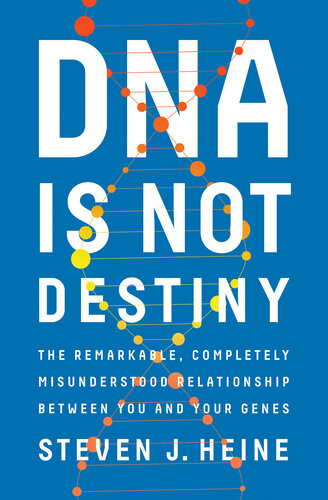
DNA Is Not Destiny
The Remarkable, Completely Misunderstood Relationship between You and Your Genes
رابطه قابلتوجه و کاملا درک نشده بین شما و جنسهای شما
کتاب های مرتبط
- اطلاعات
- نقد و بررسی
- دیدگاه کاربران
نقد و بررسی

February 13, 2017
Heine, a professor of psychology at the University of British Columbia, explores the “psychological biases” that prevent people from thinking effectively about the implications of breakthroughs in genetics. He makes the case that far too many people hold the “belief that our genes control our lives,” adding, We are genetic fatalists.” Heine tasks himself with educating his audience about the errors inherent in this perspective because “people with greater understanding about genetics are less likely to agree that genes determine life outcomes, less likely to subscribe to eugenic beliefs, and are in general less racist and less sexist.” He makes three straightforward and interconnected points: that there is rarely a one-to-one correspondence between a gene and a behavior; that people assume that an individual’s genes define the essence of their being; and that the public is breathtakingly ignorant about genetics in general. Heine ranges broadly, discussing both historical and ethical concerns, and draws heavily on social psychology research to investigate how people’s beliefs about the power of genes influence their behavior. Heine also makes a strident critique of the direct-to-consumer genetic testing industry and a robust defense of most genetically modified organisms. This is an enjoyable and informative, if uneven, discussion of the role genes play in our everyday lives.

March 15, 2017
Does the human genome include a thread for the likelihood of falling for hype? If it does, then it would be fine vindication for this sharp book on the limitations of genetics in understanding what makes us tick.What makes people tall? What makes people smart? What makes some people more likely to develop breast cancer than others? The common shorthand these days would be to lay blame or responsibility, depending on the matter at hand, on one's genetic makeup. However, as Heine (Social and Cultural Psychology/Univ. of British Columbia; Cultural Psychology, 2007) writes, that's a two-edged sword of an answer, for while understanding genetic issues has led to some moments of detente in the culture wars--e.g., acceptance of homosexuality as an expression of biology--it is also not necessarily complete. For instance, he argues, genetics itself cannot fully explain why people grow taller when their diets improve or why people raised by affluent adopted parents score higher on IQ tests than their less affluent peers. Such issues can be thorny, and to his credit, Heine does not shy away from them even as he takes on the popularity of consumer-level genomics to predict the propensity for disease, which he reckons to be about as accurate as -the fortune-teller down the street, and at least she isn't claiming any scientific foundation to her predictions.- The author is generally affable, but he also is impatient with pseudo-science; he writes, for instance, that the more people actually know of genetics the less likely they are to be worried about genetically modified food, while terms such as the -breast cancer gene- or the -height gene- are worse than misnomers, since many more genes than one are implicated. To increase a baby's height, by Heine's reckoning, you would need to effect -almost 300,000 genetic alterations to the embryo, and you would still only be halfway there.- An accessible contribution to what the author calls -genetic literacy- and a satisfyingly hard-edged work of popular science.
COPYRIGHT(2017) Kirkus Reviews, ALL RIGHTS RESERVED.

























دیدگاه کاربران